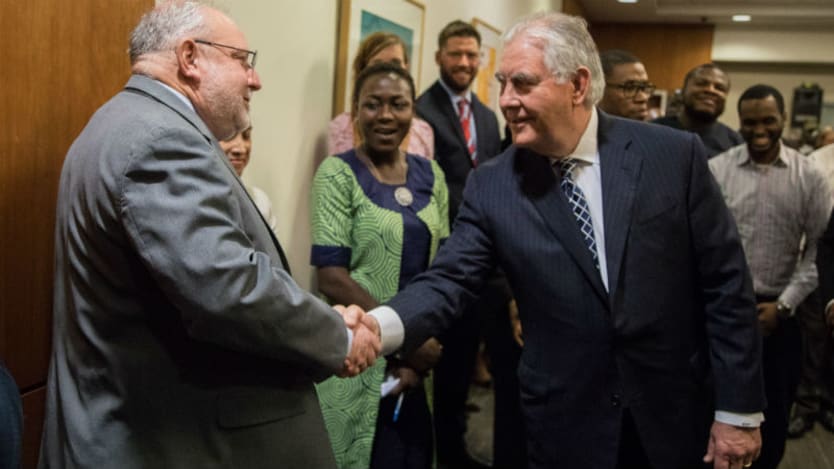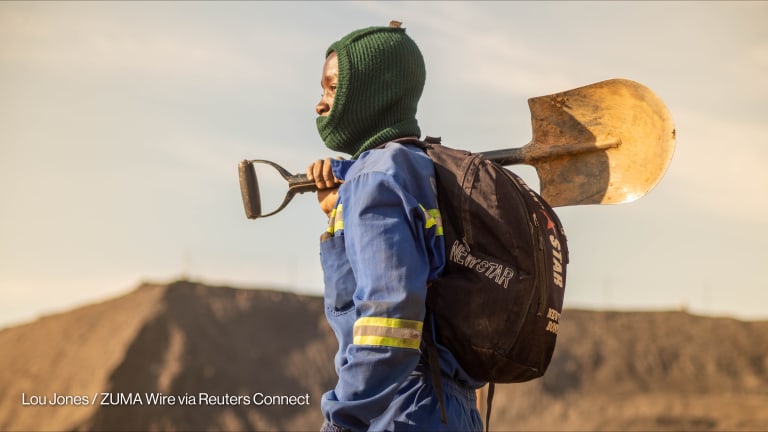
ABIDJAN — The sudden firing of Rex Tillerson as U.S. secretary of state on Tuesday came less than four hours after America’s now ex-top diplomat landed back in Washington, D.C., following an early return from his first official visit to Africa, a move that some development experts argue has undermined diplomatic advances made during his time there.
During his five-country tour, Tillerson sought to re-establish relations with top African Union officials and other leaders, while many ambassador roles remain vacant and questions persist around the Trump administration’s interest in aiding the continent. But Tillerson ended his visit a day early and returned to the U.S., where Trump promptly tweeted about his dismissal and replacement with CIA chief Mike Pompeo.
“Taken together with the administration’s position on immigration, human rights and climate change, Tillerson’s firing signals the progressive erosion of U.S. soft power in Africa, and by implication U.S. relevance to Africa’s development agenda,” Dr. Bonny Ibhawoh, African history teacher at McMaster University, wrote in a statement to Devex. Ibhawoh called his replacement a “setback” to already delicate ties.
“Obviously it is not good for Africa and the timing is horrible,” Constituency for Africa President Melvin Foote told Devex.
Experts pointed out that relations between African countries and the U.S. were already on rocky ground following widespread media reports — denied by the White House — that Trump had called them “shithole countries” during discussions over immigration. The reported remarks were raised several times during the Tillerson trip and now his firing is likely to increase the sense that Africa is not high on the Trump foreign policy agenda.
“Tillerson’s abrupt firing leaves questions about the Trump administration’s commitment to constructive engagement with Africa,” said Ibhawoh.
Tillerson had sought to build bridges during the visit, especially around the issue of security, which is seen by many as a vital precursor to development, as well as a key U.S. strategic objective. During the last day of his visit to Africa, a recurrent message of countering violent extremism across the Sahel region resonated during his speeches in Chad and Nigeria.
Just the day before, Tillerson had delivered a message of continued American support and appreciation for the leadership of Chad and Nigeria in the fight against radical extremism and their involvement in the Lake Chad Basin Multinational Task Force — whose mandate seeks to defeat Boko Haram and ISIS affiliates in West Africa.
“We know that Chad faces many security threats on each of its borders [and] the United States values Chad as a strategic partner in this region,” Tillerson said in N’Djamena on Monday.
Last year, President Donald Trump included Chad as one of eight countries whose residents were banned from immigration and non-immigrant travel to the U.S., despite being praised as a counterterrorism partner. Originally believed to be part of the ban due to missing information requested by Homeland Security, Tillerson said improvements to strength the control over its passport distribution and information sharing of people of concern and potential terrorists could prove to be the foundation that allows the U.S. to “begin to normalize the travel relationship with Chad,” he said.
Following his Chadian visit, Tillerson spent Monday afternoon in Nigeria. When asked how the U.S. will specifically help Nigeria fight extremist violence, Tillerson responded: “The way we support is in providing [Nigeria] capability, capacity whether its equipment, training personnel for special operations, and sharing certain intelligence to ensure that they have all the information available to plan and carry out a recovery effort.”
Along with security, enhancing trade and increasing American investments in Africa were also repeated topics in Tillerson’s speeches. As Africa’s largest economy, Nigeria was also America’s second-largest trading partner on the continent last year with over $9 billion in Nigerian-U.S. goods traded in 2017. Tillerson announced the creation of the U.S.-Nigeria Commercial and Investment Dialogue and a Trade and Investment Framework Council as means of building business networks between the two countries and increasing investment from the United States.
Tillerson also warned of African nations becoming overly dependent on Chinese aid and cautioned countries to deeply examine agreements and the terms of debt to see whether they are in fact creating local jobs and increasing local capacity. “We have seen in other countries where countries were not so careful and as a result got themselves in a situation where they ultimately lost control of their infrastructure, ownership of it and the operatorship of it,” Tillerson said in Abuja.
Although Chinese investments have been pivotal in addressing infrastructure deficiencies on the continent, they have often been criticized for the parameters of their financing and for bringing foreign labor. Tillerson urged countries to consider alternative financing mechanisms and pushed governments to “create the right conditions around those infrastructure investments” to expand the potential for public-private co-investments in infrastructure.
“We are developing mechanisms, and the president has charged his executive staff to develop alternative financing mechanisms that will create alternative opportunities to what China is offering,” he said. “As friends of all countries, we’re just asking: be careful.”
Some African experts are not convinced that Tillerson’s truncated visit changed local opinions that Africa is a low development priority to the U.S., and some warned that Pompeo might even change tack or retreat from Tillerson’s commitments.
“What remains to be seen is how the new secretary of state will live up to what was said and relayed on behalf of the U.S. during the past week, but I’m not so confident that will happen,” Foote said.








